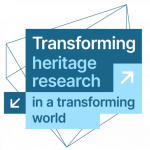CAA-Greece
The Greek chapter of the international non-profit organisation “Computer Applications and Quantitative Methods in Archaeology” was established in 2012.
News
Upcoming Conference
 |
The 5th CAA-GR Conference 2024
“Transforming heritage research in a transforming world”16-17 April 2024, Serres, Greece |
Members of CAA-GR
 |
Members of CAA-GR are scientists from the fields of archeology, social sciences, life sciences, arts, mathematics, information technology, engineers and scientists in all fields of cultural heritage. |